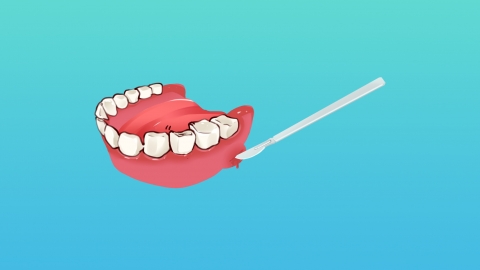How to restore blackened gums to normal
Under normal circumstances, blackened gums may be caused by long-term smoking, improper diet, gingivitis, periodontitis, lead poisoning, or other reasons. It is recommended to seek medical attention promptly, identify the underlying cause, and then improve the condition under a doctor's guidance through general treatments, medications, etc. Specific analyses are as follows:

1. Long-term smoking: Substances in cigarettes such as nicotine and tar can adhere to the gum surface over time, gradually forming black pigmentation that affects the appearance of the gums. Smoking should be stopped immediately to reduce continuous pigment deposition. Brush teeth thoroughly every day using toothpaste containing whitening ingredients, with each brushing session lasting no less than 3 minutes.
2. Improper diet: Frequent consumption of dark-colored foods or beverages such as coffee, strong tea, and chocolate can easily lead to pigments adhering to the gum surface, causing the gums to darken. Adjust dietary habits and reduce the frequency of consuming dark-colored foods and drinks.
3. Gingivitis: Long-term irritation from dental plaque and tartar can trigger gum inflammation. Inflamed gums may become congested and swollen, and some patients may develop pigmentation leading to blackening. Patients should follow medical advice to use oral rinses such as hydrogen peroxide solution, chlorhexidine mouthwash, or metronidazole mouthwash to clean the mouth and reduce inflammation.
4. Periodontitis: If gingivitis is not treated promptly, the inflammation may progress and affect periodontal tissues, leading to periodontal pocket formation and alveolar bone resorption. The gums may darken or turn black, and may also be accompanied by gum recession and loose teeth. Patients should follow medical advice to take medications such as metronidazole tablets, amoxicillin capsules, or tinidazole tablets to control infection.
5. Lead poisoning: Prolonged exposure to lead results in its accumulation in the body, which may deposit along the gumline via the bloodstream, forming a black line known as "Burton's line," causing the gums to appear black. Patients must immediately remove themselves from lead-contaminated environments and, under medical supervision, use medications such as calcium disodium edetate injection, sodium dimercaptosuccinate injection, or penicillamine tablets to promote lead excretion.
In daily life, maintain good oral hygiene habits, avoid consuming excessively cold, hot, spicy, or irritating foods to minimize gum irritation, and consume more fresh vegetables and fruits rich in vitamin C to enhance gum resistance.






